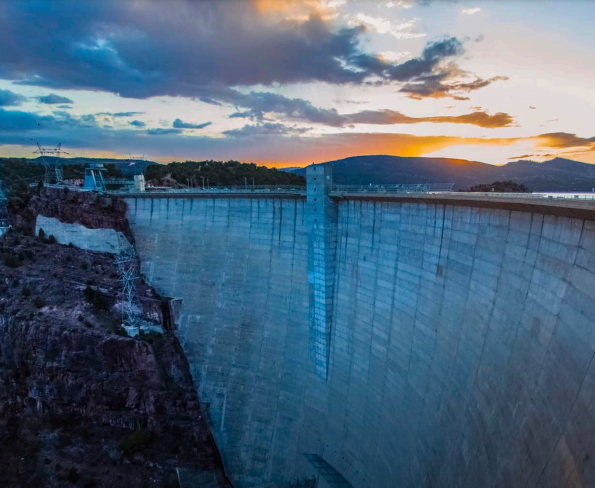Investment into impactful, resilient and sustainable infrastructure projects stands out as the most effective weapon against South Africa’s triple-threat of low economic growth, poverty and unemployment. This message crystalised during the Sanlam Investments Critical Conversations event which challenged stakeholders from the private and public sectors to reimagine the country under an ‘Infrastructure for Good’ theme. “If we are serious about fighting unemployment and poverty, then infrastructure is the best weapon in our arsenal,” said Ockert Doyer, Head of Credit and Portfolio Manager of the Sanlam Investments Sustainable Infrastructure Fund.
The ensuing debate focused on how government and the private sector, in partnership, should go about funding and managing the R6 trillion in infrastructure investments that need to take place in South Africa between present day and 2030. According to Doyer, government had capacity for about two thirds of this sum, with the ‘gap’ likely to come from the private sector, including retirement fund assets.
The need for investable, green infrastructure projects
There is broad consensus that green, impactful and resilient infrastructure investment can go some way towards addressing the country’s challenges. “South Africa’s socioeconomic ills are very complex, and I am not sure that infrastructure investment solves it all; but what I can say is that quality infrastructure is a key differentiator between developing and developed countries,” said Catherine Koffman, Group Executive: Project Preparation at the Development Bank of South Africa (DBSA). The caveat is that large infrastructure projects have to tie in with global environmental and social themes, or risk becoming stranded assets.
The event highlighted the need for large infrastructure projects to be investible for private investors, whether based locally or offshore. If this could be achieved, then the local retirement fund industry could play a significant role in addressing the country’s infrastructure investment shortfall. Ndabe Mkhize, Founding Chairman of the Asset Owners Forum South Africa, noted that local retirement funds invested less than 10% of their assets in infrastructure projects and private markets compared to around 26% in developed markets. The Asset Owners Forum is working to improve this outcome.
“We need to see this allocation increasing, and government has intervened by changing Regulation 28 of the Pension Funds Act to allow pension funds to invest more,” Mkhize said, before adding that improvements to the tax dispensation and a renewed focus on ESG factors in infrastructure projects would go a long way to getting the private sector on board. Insofar as matching retirement fund liabilities, Mkhize observed that much of the private market infrastructure universe already offered lower risk than some investment grade corporate debt. As such, SA savers need to catch up with the rest of the world when it comes to putting a larger chunk of their money into such opportunities.
Their reluctance, according to the panel moderator, stemmed from frequent horror stories about the mismanagement of big budget public projects. According to Doyer, private sector involvement in blended finance arrangements is an excellent way to address retirement fund trustee’s concerns over governance. “Private sector involvement brings extra governance; if the private sector invests in an infrastructure project, we take a keen interest in monthly or quarterly operational reports and ensure that the project achieves what it set out to do; we have to be responsible with the pension funds we have at our disposal,” he said.
The just transition imperative
Another concern that surfaced during Critical Conversations was that the capital raised on the international stage is increasingly coming with strings attached. For example, the US$8.5 billion secured at the COP26 conference in Glasgow, Scotland in November 2021 is earmarked to assist South Africa in reducing its global greenhouse gas emissions, which means, among other things, transitioning away from coal-based electricity.
This narrow focus presents difficulties for a country where so much of the economic activity attaches to industries up and down the fossil fuel value chain. It is not just coal miners and power producers that will be affected by net-zero but the engineering, logistics and manufacturing firms that support them, not to mention that all businesses benefit from Eskom’s dirty power. The entire South African landscape needs to adjust and react as global action on climate change and net-zero gains traction. “We cannot address environmental risks without understanding that each decision in that area has social consequence; our focus must remain on achieving a just transition,” said Doyer.
Economic development and sustainability go hand-in-hand
His sentiment was echoed by Koffman, who said that it was very important to decarbonise South Africa’s economy gradually, so that we leave no one behind. She added that economic development and sustainability were not mutually exclusive, and that a country could not have one without the other. “We will face problems if we do not transition; but fortunately the world is alive to a transitioning journey,” she said. It would be up to government, in partnership with the public sector, and assisted by South African savers to ensure that everyone was on board for the just transition journey.
“The quality of a country’s infrastructure influences its quality of life,” concluded Doyer. “By lifting the level of investment in electricity, healthcare, schooling, transport and other critical infrastructure, we have a real chance of increasing the country’s economic capacity and improving the day-to-day lives of all its citizens”.
